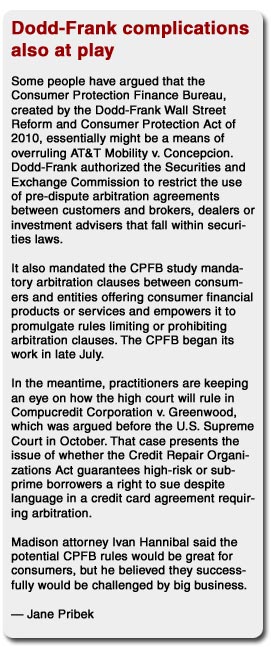Lawyers debate need for new arbitration legislation
By: Jane Pribek//November 22, 2011//

 Opponents of mandatory arbitration clauses in consumer contracts have not given up the fight.
Opponents of mandatory arbitration clauses in consumer contracts have not given up the fight.
In May, in the wake of AT&T Mobility v. Concepcion, lawmakers in both houses reintroduced the Arbitration Fairness Act. The bill would ban pre-dispute mandatory arbitration clauses in consumer and employment contracts and in civil rights disputes.
The U.S. Supreme Court’s Concepcion decision held that state laws limiting companies’ ability to require bilateral arbitration of disputes are preempted by the Federal Arbitration Act. Lawmakers pushing for the AFA said the FAA stripped workers and consumers of their right to redress against powerful corporations.
“Concepcion was a game-changer,” said Ivan Hannibal, a Madison attorney. “I have a couple of cases in arbitration right now. You sit there and fight about everything except the actual fight.”
But commercial litigator and American Arbitration Association arbitrator Rebecca Bradley said she disagrees with the reasoning behind the AFA push.
“Proponents of this bill argue that consumers and employees don’t really have the ability to truly consent to these clauses — they’re forced to agree to them,” the Milwaukee-based lawyer said. “But a prospective employee can choose not to work for an employer who requires arbitration for employment disputes. Likewise, a consumer can elect not to transact business with companies that require arbitration of disputes.”
The AFA has been re-introduced in both houses of Congress since 2007, but failed to gain enough momentum to get to a vote. It has faced resounding opposition from business groups including the U.S. Chamber of Commerce, which has criticized the measure as an open invitation for filing frivolous lawsuits against companies.
In addition to the AFA, lawmakers in October introduced the Consumer Mobile Fairness Act, which would prohibit mandatory arbitration clauses in cell phone and mobile data service contracts.
Both bills have been referred to the Senate Judiciary Committee, which conducted a public hearing on the AFA (See related story: “Committee debates fairness of mandatory arbitration,” page 18).
Sen. Herb Kohl, D-Wis., a committee member, has not taken a position on the proposed acts, said Dawn Schueller, his Washington press secretary.
“But he has raised concerns with mandatory pre-dispute arbitration clauses in the past,” she said, “specifically in the context of nursing home admissions contracts.”
Sen. Ron Johnson, R-Wis., and his staff members did not return calls for comment.
The renewed push for new arbitration laws is not going away anytime soon, said Hannibal, of the Consumer Rights Law Office.
“Obviously, it’s a good thing for consumers,” he said.
Bradley said there are plenty of positives to arbitration, however.
“There are exceptions, but arbitration generally can be a lot less expensive and time-consuming, and a lot easier for individuals who cannot afford counsel, unlike civil lawsuits,” she said.
The American Arbitration Association and many other groups have programs that process cases quickly and cost-effectively, she said.
Bradley said she rejected the notion that arbitrations were unfair to consumers. Companies prevail most often, she said, but that’s because consumers are more likely to bring meritless claims.
“Arbitrators are still required to follow the law, and if they don’t and manifestly disregard the law, their decisions are subject to review and can be overturned,” she said. “It happens rarely. But I think that’s because arbitration associations do a good job of screening and selecting good arbitrators who follow the law.”
From a public-policy perspective, Bradley said she disagreed with the proposed legislation’s goals because it limited freedom of contract.
“This is another piece of legislation that looks like it’s designed to strangle businesses and increase costs by forcing them to go into court,” she said.
But the FAA originally was intended for companies, Hannibal said, presumably with equal or somewhat equal bargaining power, to resolve disputes between themselves. It was not meant for huge companies with teams of lawyers versus a lone consumer, he added.
Moreover, he said, frequently the arbitrator is paid by the large company being sued.
“If you’re an arbitrator and they keep on sending you business,” Hannibal said, “well, I don’t know, but it doesn’t take a brain surgeon to figure out how they’ll tend to rule.”
Kimberly Atkins of Dolan Newswires also contributed to this report.
Legal News
- FTC bans non-competes
- Gov. Evers seeks applicants for Dane County Circuit Court
- Milwaukee man charged in dismemberment death pleads not guilty
- Democratic-led states lead ban on the book ban
- UW Madison Professor: America’s child care crisis is holding back moms without college degrees
- History made in Trump New York trial opening statements
- Prosecutor won’t bring charges against Wisconsin lawmaker over fundraising scheme
- Republican Wisconsin Senate candidate says he doesn’t oppose elderly people voting
- Vice President Harris to reveal final rules mandating minimum standards for nursing home staffing
- Election workers fear threats to their safety as November nears
- Former law enforcement praise state’s response brief in Steven Avery case
- Eric Toney announces re-election bid for Fond du Lac County District Attorney
WLJ People
- Power 30 Personal Injury Attorneys – Russell Nicolet
- Power 30 Personal Injury Attorneys – Benjamin Nicolet
- Power 30 Personal Injury Attorneys – Dustin T. Woehl
- Power 30 Personal Injury Attorneys – Katherine Metzger
- Power 30 Personal Injury Attorneys – Joseph Ryan
- Power 30 Personal Injury Attorneys – James M. Ryan
- Power 30 Personal Injury Attorneys – Dana Wachs
- Power 30 Personal Injury Attorneys – Mark L. Thomsen
- Power 30 Personal Injury Attorneys – Matthew Lein
- Power 30 Personal Injury Attorneys – Jeffrey A. Pitman
- Power 30 Personal Injury Attorneys – William Pemberton
- Power 30 Personal Injury Attorneys – Howard S. Sicula











